» Site Map
» Home Page
Historical Info
» Find Friends - Search Old Service and Genealogy Records
» History
» QAIMNS for India
» QAIMNS First World War
» Territorial Force Nursing Service TFNS
» WW1 Soldiers Medical Records
» Field Ambulance No.4
» The Battle of Arras 1917
» The German Advance
» Warlencourt Casualty Clearing Station World War One
» NO 32 CCS Brandhoek - The Battle of Passchendaele
» Chain of Evacuation of Wounded Soldiers
» Allied Advance - Hundred Days Offensive
» Life After War
» Auxiliary Hospitals
» War Graves Nurses
» Book of Remembrance
» Example of Mentioned in Despatches Letter
» Love Stories
» Autograph Book World War One
» World War 1 Letters
» Service Scrapbooks
» QA World War Two
» Africa Second World War
» War Diaries of Sisters
» D Day Normandy Landings
» Belsen Concentration Camp
» Italian Sailor POW Camps India World War Two
» VE Day
» Voluntary Aid Detachment
» National Service
» Korean War
» Gulf War
» Op Telic
» Op Gritrock
» Royal Red Cross Decoration
» Colonels In Chief
» Chief Nursing Officer Army
» Director Army Nursing Services (DANS)
» Colonel Commandant
» Matrons In Chief (QAIMNS)
Follow us on Twitter:

» Grey and Scarlet Corps March
» Order of Precedence
» Motto
» QA Memorial National Arboretum
» NMA Heroes Square Paving Stone
» NMA Nursing Memorial
» Memorial Window
» Stained Glass Window
» Army Medical Services Monument
» Recruitment Posters
» QA Association
» Standard
» QA and AMS Prayer and Hymn
» Books
» Museums
Former Army Hospitals
UK
» Army Chest Unit
» Cowglen Glasgow
» CMH Aldershot
» Colchester
» Craiglockhart
» DKMH Catterick
» Duke of Connaught Unit Northern Ireland
» Endell Street
» First Eastern General Hospital Trinity College Cambridge
» Ghosts
» Hospital Ghosts
» Haslar
» King George Military Hospital Stamford Street London
» QA Centre
» QAMH Millbank
» QEMH Woolwich
» Medical Reception Station Brunei and MRS Kuching Borneo Malaysia
» Military Maternity Hospital Woolwich
» Musgrave Park Belfast
» Netley
» Royal Chelsea Hospital
» Royal Herbert
» Royal Brighton Pavilion Indian Hospital
» School of Physiotherapy
» Station Hospital Ranikhet
» Station Hospital Suez
» Tidworth
» Ghost Hunt at Tidworth Garrison Barracks
» Wheatley
France
» Ambulance Trains
» Hospital Barges
» Ambulance Flotilla
» Hospital Ships
Germany
» Berlin
» Hamburg
» Hannover
» Hostert
» Iserlohn
» Munster
» Rinteln
» Wuppertal
Cyprus
» TPMH RAF Akrotiri
» Dhekelia
» Nicosia
Egypt
» Alexandria
China
» Shanghai
Hong Kong
» Bowen Road
» Mount Kellett
» Wylie Road Kings Park
Malaya
» Kamunting
» Kinrara
» Kluang
» Penang
» Singapore
» Tanglin
» Terendak
Overseas Old British Military Hospitals
» Belize
» Falklands
» Gibraltar
» Kaduna
» Klagenfurt
» BMH Malta
» Nairobi
» Nepal
Middle East
» Benghazi
» Tripoli
Field Hospitals
» Camp Bastion Field Hospital and Medical Treatment Facility MTF Helmand Territory Southern Afghanistan
» TA Field Hospitals and Field Ambulances
NO 32 CCS Brandhoek - The Battle of Passchendaele
General Sir Douglas Haig desired to reach the coast of Belgium where the Germans had a submarine base whose blockade was crippling the British war effort. The month previously, June 1917, his troops had a successful attack on Messines Ridge in June 1917 and this gave him the encouragement to initiate a long awaited British offensive in Flanders. Thus, an artillery barrage was initiated prior to the infantry attack on the 31 July 1917. Unfortunately, the constant shelling had destroyed the drainage system that had been implemented within this former marshland. An additional problem for the infantry was the downpour of rain, the heaviest in thirty years. Both these factors turned the heavy clay soil into a long battle that would be known for its muddy conditions and fought over months on this flat plain.
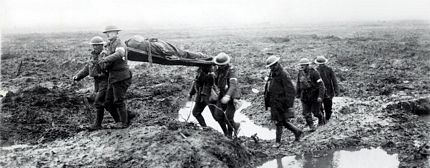
Canadian troops carry a wounded man to the aid post 1917.
This Third Battle of Ypres is often called The Battle of Passchendaele because British and Canadian forces took control of this small village on the 6 November 1917. In these 3½ months the British and Empire forces had advanced barely 5 miles. The Germans lost 220,000 lives whilst the British lost an estimated 250,000 casualties including 36,000 Australians, 3,500 New Zealanders and 16,000 Canadians.
The wounded were cared for by army nurses which included Nursing Sister Kate Luard of the Queen Alexandra's Imperial Military Nursing Service Reserve, the QAIMNS(R). Below are extracts of her war diary, published in Unknown Warriors: The Letters of Kate Luard, RRC and Bar, Nursing Sister in France 1914-1918
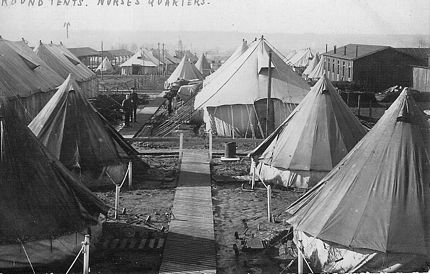
Tented nurses' quarters at a Casualty Clearing Station.
In her letters home, she vividly describes events under the continuous bombardment of shells and guns and the atrocious muddy conditions for medical teams and soldiers alike, making this one of the most dangerous places for her unit when it was relocated in late July 1917 to Brandhoek to serve the 'push' that was to become the Battle of Passchendaele. Here, alternating with No.44 CCS and No.3 Australian CCS, all close to the Front, the CCSs are set up to take in the wounded soldiers and operate within hours of their injuries.
July 23rd. St Omer. Orders came yesterday for us to move and we are just off.
July 25th. Brandhoek. We got to Railhead (Poperinghe) about 5 p.m. The station was being shelled. Everyone was turned out of the train about 1½ miles before the station and at last the D.M.S. [Director of Medical Services] sent five Ambulances. . . but here we are. Ten other Sisters had arrived to-day, which makes twenty, and six more come to-morrow. I shall probably have 30. There are about 30 Medical Officers, including some of the pick of the B.E.F. [British Expeditionary Force]; we are for Abdomens and Chests - 8 Theatre Teams.
It is a brilliant starlight night and the battle line, four miles away, is blazing with every conceivable firework and the noise is terrific. We've been dished out with gas helmets and tin hats.
Friday July 27th. Yesterday everything went so well one knew it couldn't last. The hospital had only been pitched since last Saturday and it was really splendid. This venture so close to the Line is of nature an experiment in life-saving, to reduce the mortality rate from abdominal and chest wounds. Hence this Advanced Abdominal Centre, to which all abdominal and chest wounds are taken from a large attacking area, instead of going on with the rest to the C.C.S.'s six miles back.
We are entirely under Canvas, with huge marquees for Wards, except the Theatre which is a long hut. The Wards are both sides of a long, wide central walk of duckboards.

'Wounded at a Casualty Clearing Station' c. 1917. A wash drawing by D Lindsay.
Sir Anthony Bowlby turned up later [Consulting Surgeon to the 2nd Army and Advisor on Surgery to the British Army]. It is his pet scheme getting operations done up here within an hour or two of getting hit, instead of further back or at the Base. That is why our 30 Medical Officers include the largest collection of F.R.C.S.'s ever collected at any Hospital in France before, at Base or Front, twelve operating Surgeons with Theatre Teams working on eight tables continuously for the 24 hours, with 16 hours on and 8 off.
Monday, July 30th, midnight, Brandhoek By 6 a.m. our part will have begun and everything is organised and ready up to the brim. That we have 15 Theatre Sisters tells its own tale. We have 33 sisters altogether, and they are all tucked into their bell-tents with hankies tied on to the ropes of the first ones to be called when the first case comes in.
We have had a Gas Drill to-night. It is a beastly job and rather complicated, and has to be done in six seconds to be any good; we all take about six minutes! Some Grandmothers (15-inch guns) on each side of us are splitting the air and rocking the huts. Fritz is sending his over too. The illumination is brighter than any lightening: dazzling and beautiful. Their new blinding gas is known as mustard-oil gas; it burns your eyes - sounds jolly doesn't it? and comes over in shells.
4.15 a.m. The All-together began at 5 minutes to 4. We crept out on the duck boards and saw. It was more wonderful and stupendous than horrible. There was the glare before day-light of the searchlights, star shells and gun- flashes, and the cracking, splitting and thundering of the guns of all calibres at once. No mines have gone up yet.
6.30 a.m. We have just begun taking in our first cases. The mines have been going off since 5 like earthquakes. Lots of high explosive has been coming over, but nothing so far into this Camp. I am going now to the Preparation and Resuscitation Hut.
Follow us on Facebook, Instagram and Twitter.

My PTSD assistance dog, Lynne, and I have written a book about how she helps me with my military Post Traumatic Stress Disorder, anxiety, and depression. I talk about my time in the QAs and the coping strategies I now use to be in my best health.
Along the way, I have had help from various military charities, such as Help for Heroes and The Not Forgotten Association and royalties from this book will go to them and other charities like Bravehound, who paired me with my four-legged best friend.
I talk openly about the death of my son by suicide and the help I got from psychotherapy and counselling and grief charities like The Compassionate Friends.
The author, Damien Lewis, said of Lynne:
"A powerful account of what one dog means to one man on his road to recovery. Both heart-warming and life-affirming. Bravo Chris and Lynne. Bravo Bravehound."
Download.
Buy the Paperback.

This beautiful QARANC Poppy Pin Badge is available from the Royal British Legion Poppy Shop.
For those searching military records, for information on a former nurse of the QAIMNS, QARANC, Royal Red Cross, VAD and other nursing organisations or other military Corps and Regiments, please try Genes Reunited where you can search for ancestors from military records, census, birth, marriages and death certificates as well as over 673 million family trees. At GenesReunited it is free to build your family tree online and is one of the quickest and easiest ways to discover your family history and accessing army service records.
More Information.
Another genealogy website which gives you access to military records and allows you to build a family tree is Find My Past which has a free trial.
July 31st, 11 p.m. Everything has been going at full pitch - with the 12 Teams in Theatre only breaking off for hasty meals - the Dressing Hut, the Preparation Ward and Resuscitation and the four huge Acute Wards, which fill up from the Theatre; the Officers' Ward, the Moribund and German Ward. Soon after 10 o'clock this morning he [Fritz] began putting over high explosives. Everyone had to put on tin hats and carry on. They burst on two sides of us, not 50 yards away - no direct hits on to us but streams of hot shrapnel. . they came over everywhere, even through our Canvas Huts in our quarters. Luckily we were so frantically busy. It doesn't look as if we should ever sleep again. Of course, a good many die, but a great many seem to be going to do. We get them one hour after injury, which is our 'raison d'κtre' for being here. . It is pouring rain, alas, and they are brought in sopping.
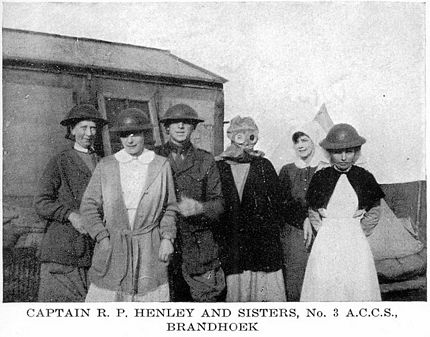
No. 3 CSS Australian Casualty Clearing Station.
Wednesday, August 1st. Soaking hopeless rain, holding up the advance. Everything is a swamp and a pond, and tents leaking and dropping. Water in some of the Wards is half-way up the legs of the beds
11.30 p.m. Just finished my last round. Soaking rain all day still going on, complete hold-up of British Army. Absolute silence of our guns and only an occasional reminder from Fritz. The abdominals coming in are very bad to-day - both Boche and British. We are to take Chests and Femurs too, as soon as No.44 and the Austr. C.C.S.'s [Casualty Clearing Stations] open which are alongside. It is getting very ghastly; the men look so appalling when they are brought in, and so many die.
12.15 midnight. It has been a pretty frightful day - 44 funerals yesterday and about as many to-day. After 24 hours of peace the battle seems to have broken out again; the din is terrific.
Thursday, August 2nd, 11.45 p.m. The uproar went on all night. It made one realise how far up we are to have streams of shells crossing over our heads. The rain continues - all night and all day since the Push began. The men are bought in with mud over their eyes and mouths, and 126 have died in 3 ½ days.
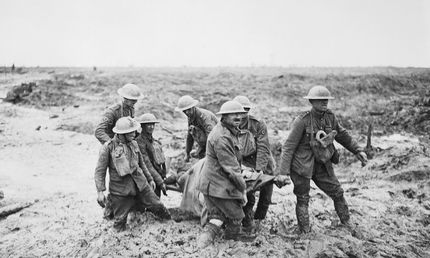
Stretcher bearers struggle through mud August 1917
Yesterday morning Capt. C. [Chavasse], V.C. and Bar, D.S.O., M.C., R.A.M.C. [Royal Army Medical Corps] was brought in. He was quickly X-rayed, operated on, shrapnel found, salined and put to bed. He is just on the borderland still but not so well to-night. He tries hard to live; he was going to be married.
Sunday, August 5th, 11.30 p.m. Capt. C. died yesterday. At his funeral to-day his horse was led in front and then the pipers and masses of kilted officers followed. After the blessing one Piper came to the graveside (which was a large pit full of dead soldiers sewn up in canvas) and played a lament.
The weather has cleared and it has been hot and the ground is drying up a bit. They are going over the top to-morrow. 'Lizzie' splitting her jaws, shells screaming and bursting and bombs dropping. There's no sort of cover anywhere. We shall be busy to-morrow, so I'll have a shot at going to bed.
12 p.m. Monday, August 6th. It has been a very quiet day after all - very few coming in and a nice lot of recoveries evacuated by Ambulance to the nearest Train 5 miles back.
Tuesday, August 7th. The patients establish their personal relationship with us all - Sisters, Orderlies and Medical Officers - as soon as they are out of the anaesthetic. Nothing is spared to pull them through; eggs at any price, unlimited champagne, port, stout, fresh milk, chicken, porridge and everything you can't get at the Base. The Quartermaster scours the towns every day in a lorry. I get loads of Red Cross stuff nearly every day from the B.R.C.S. at Lillers, and Oxygen, drugs, instruments and Medical Stores pour in.
A boy called Reggie in the Moribund Ward was wailing 'I do feel bad and no one takes no notice of me'. When I comforted him he said 'You're the best Sister in the world - I know I'm a nuisance, but I can't help it - I've been out there so long and I'm so young - Will you give me a sleeping draft and a drop o'champagne to make me strong?' He had both and slept like a lamb, but he died to-day.
There is a fine broad duck-walk down the middle of the Hospital with the Wards (huge tents) on each side, which in the evenings is a sort of Rotten Row for Surgeons and Sisters on their late round, where you compare notes and watch the barrage. The topics are exclusively abdomens, guns, Huns, shells and bombs!
Wednesday, August 8th. The D.M.S. came to-day and told us to expect work to-morrow but the Satanic Power that presides over the weather in the War has decreed otherwise. Floods of rain dissolving the ground and a violent thunderstorm this evening must have put the lid on any sort of Attack for us. Three men in the Dressing Hut were struck by lightning to-night Officers from the line tell the grimmest tales. The conditions are appalling; the men are drowning in shell-holes and the enemy artillery are so 'active' that the dead are heaping up.
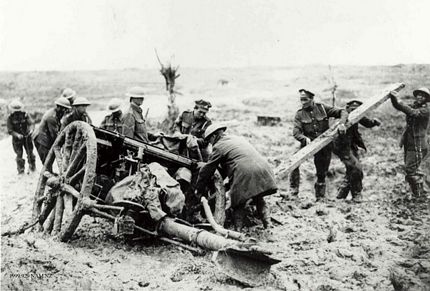
Men jacking up a field gun in an attempt to extract it from the mud
Thursday, August 9th. There is a cheery little Military Decauville Railway for ammunition only - a series of baby trains puff through loaded to the teeth with shells, or coming back with empty cases. Now No.44 C.C.S. is coming in we are no longer the one and only; we can take in alternate 50's of abdomens and compound fractured femurs.
Friday, August 10th. The attack began on the two corners of the Salient to-day. A lot of abdominals and some femurs are still coming in. Some have died to-day and are dying to-night. . but we have had an Evacuation by Train this afternoon. A bashed-to-pieces Officer with both legs, both arms, face and back wounded, gassed and nearly blind doesn't look as if he'd do. (Died at 8 a.m.)

Saturday, August 11th. There is a thunderstorm on and it's pouring cats and dogs upon our Army .
Monday, August 13th. Our 12 Australian Sisters and 10 Australian Orderlies rejoin their own Unit to-morrow. They open to-morrow and we three C.C.S.'s take in now in batches of 50 each, abdomens, chests and femurs.
Tuesday, 14th. Lots of rain and thunderstorms again. Had a run of bad cases to-day, most of whom have died.
Wednesday, August 15th, 11.30 p.m. This has been a horrid day. He bombed a lot of men nearby and all who weren't killed came to us. Some are still alive but about half died here.
7 a.m., Thursday, August 16th. Bombardment still going at top speed. The stream of little trains of H.E. [high explosive] shell passing through the last few days has not been for nothing.
12.30 midnight. There was no sleep after the Blast began last night and we've had a mighty day to-day. I feel dazed with going round the rows of silent or groaning wrecks. Many die and their beds are filled instantly. One has got so used to their dying that it conveys no impression beyond a vague sense of medical failure. It is all very like a battle field. He [Fritz] dropped bombs on the Field Ambulance alongside of us, and killed an orderly and wounded others, also on the Officers' Mess of the Australian C.C.S. alongside of them - not three minutes from us, and killed a Medical Officer and a Corporal.
Saturday, August 18th. Fritz went to C.C.S.'s behind us. At one he wounded three Sisters and blew their cook-boy to pieces. At the other he wounded six Medical Officers among other casualties. A dirty trick, because he has maps and knows which are hospitals back there. Here we are in a continuous line of camps, batteries, dumps, etc.
We have been taking in to-day but not so fast. The letters to relatives who have died-of-wounds are just reaching 400 in less than three weeks. Entering them into one's book alone is more than one can make time for, but I do write to about a dozen every day or night.
We've had two dazzling days, but there is not a blade of grass or a leaf in the Camp.
August 22nd, 6 p.m. This has been a very bad day. Big shells coming over about 10 a.m. - one burst between one of our wards and the Sisters' Quarters of No.44 C.C.S. and killed a Night Sister asleep in her tent and knocked out three others with concussion and shell shock. This went on all day. The Australians' Q.M. Stores, the Cemetery, the Field Ambulance alongside, the Church Army Hut, all got hit.
Saturday, August 25th, 10.30 p.m. Brandhoek. Got back here at 8 p.m. [from St Omer] found everything very quiet, and all our quarters sandbagged to the teeth. The bell-tents are raised and lined inside waist-high with sandbags and our Armstrong Huts outside.
Monday, August 27th. The rain began last evening and is still going on; an inch fell in 8 hours during the night. The ground is already absolutely waterlogged - every little trench inches deep, shell-holes and every attempt at bigger trenches feet deep. And thousands of men are waiting in the positions and will drown if they lie down to sleep.
Three of the men we have in will die to-night, and there's a brave Jock boy who's had a leg off and is to lose an arm and an eye to-morrow who said, 'If you write to Mother, make it as gentle as you can, as she lost my brother in April, died o'wounds'.
Sunday, September 2nd. The weather has not cleared up enough yet for Active Operations. Last night some rather nasty shelling was going on and had been all day and lots of casualties were brought in; 6 died here, besides the killed in the Camps.
Monday, September 3rd. Crowds of letters from mothers and wives who've only just heard from the W.O. [War Office] and had no letter from me, are pouring in, and have to be answered. I've managed to write 200 so far, but there are 466.
2.30 a.m. the bomb fell and blew one of our Night Orderlies' sleeping tents out of existence. They'd all have been wiped out if they'd been in bed, but they were all on Night Duty.
Tuesday morning, September 4th. Got to bed in my clothes, at 4 a.m., up at 7.30. Brilliant morning; Archie racket in full blast. This acre of front so far bears a charmed life, but how long can this last? Shells and bombs shave us on all sides.
Later. Orders have come for the final evacuation of the Hospital - site considered too 'unhealthy'. We close down to-day, evacuate the patients still here, and disperse the personnel. I stay till the last patient is fit to be moved, probably to-morrow, or next day - then probably Leave for 14 days! But don't count on it, as you never know.
On returning from leave Kate Luard was sister in charge of No.37 CCS at Godeswaervelde and then No.54 CCS at Merville before rejoining No.32 CCS at Marchelepot with the 5th Army under Sir Hubert Gough.
Kate Evelyn Luard was born in 1972. She trained as a nurse at the prestigious nurse-training school of King's College, London, and served as a military nurse in South Africa during the Boer War 1900-1902. She enlisted in the QAIMNSR on 6 August 1914, two days after war was declared and served for the first year of WW1 on ambulance trains and a field ambulance; then in casualty clearing stations and base hospitals in France and Belgium until 1918. She was awarded the RRC and Bar and was twice mentioned in Despatches for gallant and distinguished service in the field.
The 2nd phase of the Battle of Arras began on April 23rd 1917 and her diary extracts can be read on the Warlencourt Casualty Clearing Station page.
Read more about Kate at kateluard.co.uk

Former Royal Air Force Regiment Gunner Jason Harper witnesses a foreign jet fly over his Aberdeenshire home. It is spilling a strange yellow smoke. Minutes later, his wife, Pippa, telephones him, shouting that she needs him. They then get cut off. He sets straight out, unprepared for the nightmare that unfolds during his journey. Everyone seems to want to kill him.
Along the way, he pairs up with fellow survivor Imogen. But she enjoys killing the living dead far too much. Will she kill Jason in her blood thirst? Or will she hinder his journey through this zombie filled dystopian landscape to find his pregnant wife?
The Fence is the first in this series of post-apocalyptic military survival thrillers from the torturous mind of former British army nurse, now horror and science fiction novel writer, C.G. Buswell.
Download Now.
Buy the Paperback.
If you would like to contribute to this page, suggest changes or inclusions to this website or would like to send me a photograph then please e-mail me.
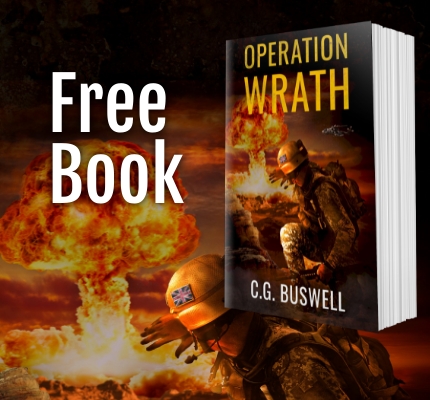
Free Book.
The death of the Brotherhood will be avenged.
RAF gunner Jason Harper and a team of Special Air Service operators are enraged after the death of their brothers by a terrorist drone strike. They fly into south-eastern Yemen on a Black-op mission to gather intelligence and avenge the death of their comrades.
Can they infiltrate the Al-Queda insurgents' camp, stay undetected, and call down their own drone missile strike and get home safely?
Will they all survive to fight another day?
Operation Wrath is a free, fast-paced adventure prequel to the non-stop action The Fence series by military veteran author C.G. Buswell.
Download for free on any device and read today.
This website is not affiliated or endorsed by The Queen Alexandra's Royal Army Nursing Corps (QARANC) or the Ministry of Defence.
» Contact
» Advertise
» QARANC Poppy Pin
» Poppy Lottery
» The Grey Lady Ghost of the Cambridge Military Hospital Novel - a Book by CG Buswell
» The Drummer Boy Novel
» Regimental Cap Badges Paintings
Read our posts on:
Offers
» Army Discounts
» Claim Uniform Washing Tax Rebate For Laundry
» Help For Heroes Discount Code
» Commemorative Cover BFPS 70th anniversary QARANC Association

Present Day
» Become An Army Nurse
» Junior Ranks
» Officer Ranks
» Abbreviations
» Nicknames
» Service Numbers
Ministry of Defence Hospital Units
» MDHU Derriford
» MDHU Frimley Park
» MDHU Northallerton
» MDHU Peterborough
» MDHU Portsmouth
» RCDM Birmingham
» Army Reserve QARANC
Photos
» Florence Nightingale Plaque
» Photographs
Uniform
» Why QA's Wear Grey
» Beret
» Army Medical Services Tartan
» First Time Nurses Wore Trousers AV Anti Vermin Battledress
» TRF Tactical Recognition Flash Badge
» Greatcoat TFNS
» Lapel Pin Badge
» Army School of Psychiatric Nursing Silver Badge
» Cap Badge
» Corps Belt
» ID Bracelet
» Silver War Badge WWI
» Officer's Cloak
» QAIMNSR Tippet
» QAIMNS and Reserve Uniform World War One
» Officer Medal
» Hospital Blues Uniform WW1
Events
» Armed Forces Day
» The Nurses General Dame Maud McCarthy Exhibition Oxford House London
» Edinburgh Fringe Stage Play I'll Tell You This for Nothing - My Mother the War Hero
» Match For Heroes
» Recreated WWI Ward
» Reunions
» Corps Day
» Freedom of Rushmoor
» Re-enactment Groups
» Military Events
» Remembrance
» AMS Carol Service
» QARANC Association Pilgrimage to Singapore and Malaysia 2009
» Doctors and Nurses at War
» War and Medicine Exhibition
» International Conference on Disaster and Military Medicine DiMiMED
» QA Uniform Exhibition Nothe Fort Weymouth
Famous QA's
» Dame Margot Turner
» Dame Maud McCarthy
» Lt Col Maureen Gara
» Military Medal Awards To QAs
» Moment of Truth TV Documentary
» Sean Beech
» Staff Nurse Ella Kate Cooke
Nursing
Nursing Jobs Vacancies UK
International Nurses Day
International Midwife Day
Info
» Search
» Site Map
» Contact
» Other Websites
» Walter Mitty Military Imposters
» The Abandoned Soldier
We are seeking help with some answers to questions sent by readers. These can be found on the Army Nursing page.
» Find QA's
» Jokes
» Merchandise
» Mugs
» Personalised Poster
» Poppy Badges
» Stamp
» Teddy Bears
» Pin Badges
» Wall Plaques
» Fridge Magnet

